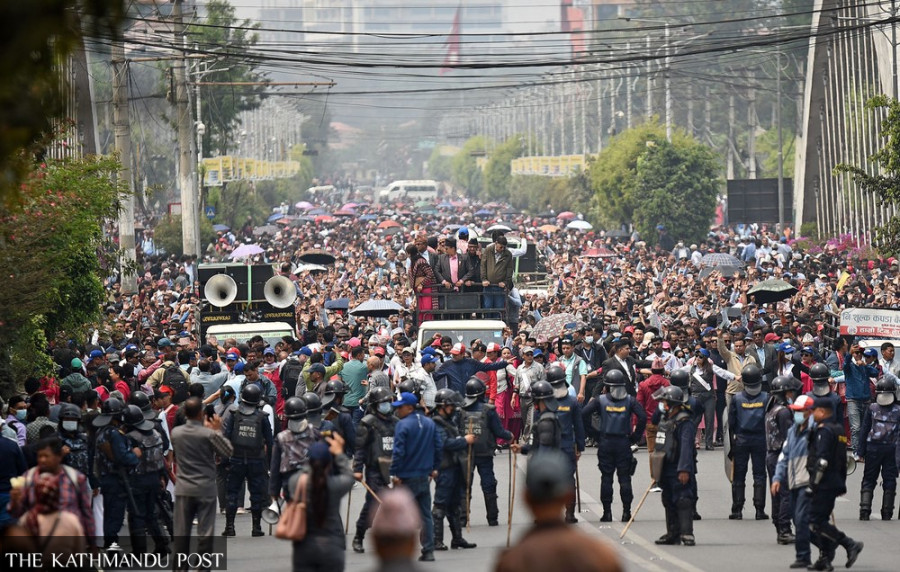Editorial
Country of protests
Nepalis have stopped believing that their grievances will be heard without a show of force.
It’s hardly a surprising figure. If anything, the number sounds like a gross underestimate. According to a new Nepal Police report, there were 3,963 protest-related events in the country in the past 10 months. The form of protests runs the whole gamut: 12 general strikes, 12 transport blockades, 816 lockouts, 782 sit-ins, 134 hunger strikes, 118 road obstructions, and 2,089 protest rallies. Really, most Nepalis are used to witnessing protests of all kinds, nearly every single day, nearly everywhere they go. Teachers, civil servants, lawyers, journalists, victims of Maoist insurgency and cooperative frauds, taxi drivers, businesspersons—they all feel the need to band together and assert themselves to get the relevant government bodies to heed their demands. These folks have long stopped believing that their grievances, even legitimate ones, will be heard without such a show of force. In other words, they have no faith in the government machinery to act fairly and independently. In a seemingly zero-sum game, if they don’t secure their rights and privileges through protests, rival groups might beat them to the prize.
There is no doubt who are the biggest culprits for this worrying loss of trust in the state machinery: the top political leaders. People see that it does not make a jot of difference whether it is KP Sharma Oli, Sher Bahadur Deuba or Pushpa Kamal Dahal who is at the helm in Singha Durbar. In their eyes— and as has been borne out by many credible public surveys—these leaders have repeatedly been tested and been found wanting. Yet they have continued to connive to occupy the most powerful executive office in the land, by turns, for most of the past decade. These old leaders, in people’s reckoning, have gamed politics to serve vested interests rather than work for the electorate as should be the case in a functioning electoral democracy. Each of the recent governments led by the heads of the three major parties—the Nepali Congress, the CPN-UML and CPN (Maoist Centre)—has been beset by allegations of widespread corruption, mismanagement and blatant abuse of authority—plus a total disregard for public opinion and interest. (The latest in the long-list of corruption cases is the ‘fake visa scam’ in which senior airport and home ministry officials have been implicated in the trafficking of Nepalis to various countries.)
In the ‘New Nepal’ these leaders have fashioned, competence and diligence count for little if you don’t have the right connections; but with the right links, you may get away even with murder. With the public losing faith in their government, they are resorting to more and more violent forms of protest, as the aforementioned police report also shows. This near complete breakdown in the compact between the electorate and their representatives bodes ill for Nepal. Yet none of the top leaders is in a mood to make a personal sacrifice in the country’s larger interest. As people’s frustration mounts, so does the risk of social unrest as more and more of them start losing faith in the democratic process.




 10.12°C Kathmandu
10.12°C Kathmandu













